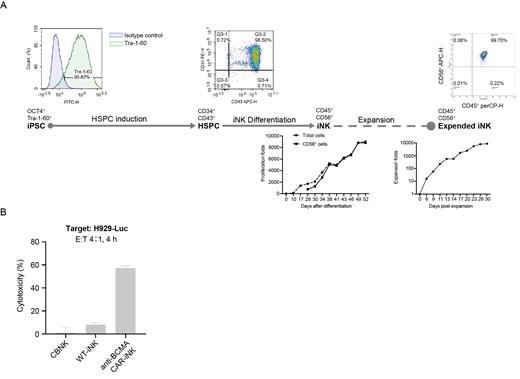Natural killer (NK) cells are innate lymphocytes that play a key role in the control of infection and malignancy. NK cells are potent killers of target cells and act in an MHC-independent manner, enabling their application as allogenic therapy for cancer. Human iPSCs are pluripotent with the ability to self-renew, thus providing an inexhaustible source for deriving NK cells. With a two-tiered cell bank system, we can manufacture NK cells with more homogeneity between batches. In principle, one single iPSC clone-derived master cell bank and working cell banks can support the life cycle of an affordable, off-the-shelf NK cell product. We developed a robust stepwise protocol for large-scale generation of high-purity NK cells from human iPSCs without the cell isolation procedure. First, human iPSCs formed embryoid bodies and then were differentiated into highly purified (>98.0%) CD34 + CD43 + hematopoietic stem and progenitor cells (HSPCs) using a combination of cytokines and small molecles such as BMP-4, VEGF, BFGF, SCF, FLT-3 and ascorbic acid. During this period, we observed up to an 180-fold cell increase in the number of HSPCs compared with human iPSCs. Second, these HSPCs were differentiated into NK cells with FLT3, SCF, IL-3, IL-7, and IL-15 etc., with cell number increased approximately 9000-fold compared with iPSCs. In the final step, iPSC-derived NK cells were further expanded up to 8000-fold which enable us to produce 1E12 NK cells from less than 1 million iPSCs. After expansion, iNK cells became more homogenous and exhibited a more mature phenotype. More than 99.0% of cells expressed both CD45 and CD56, and more than 70% expressed CD16. The expression of activating and co-stimulatory receptors (NKG2D, NKp46,NKp44, NKp30, CD244 and CD226) of NK cells was also high in these iNK cells. Intrestingly, the cells exhibited robust anti-tumor efficacy against K562 (chronic myelogenous leukemia), RPMI 8226 (multiple myeloma). Furthermore, the cryopreserved iNK cells demonstrated dramatic cytotoxicity to U-87 MG cells (malignant gliomas) in 2D culture and the tumor organoid, indicating that iNK cells derived from our protocol can be used as off-the-shelf therapy for both hematological and solid tumors.
We also observed that these iNK cells had variable cytotoxicity in other tumors. For example, our iNK were not obviously cytotoxic to the NCI-H929 cell line, derived from a plasmacytoma myeloma patient and expressing BCMA at a high level. To improve the specific cytotoxicity of NK cells to NCI-H929 cells, we transduced a anti-BCMA CAR to the donor iPSC. Following differentiation, the CAR-transduced iNK cells showed approximately 6-fold cytotoxicity compared with WT iNK. (Figure 1) Collectively, our serum-free and strom cell-free NK cell generation produre from human iPSCs provides a scalable, consistent, off-the-shelf and cost-effective NK/CAR-NK cell manufacturing platform for clinical application and NK cell-based immunotherapies.
Disclosures
Yan:Cell Inspire Biotechnology: Current Employment. Jiang:Cell Inspire Biotechnology: Current Employment. Zhu:Cell Inspire Biotechnology: Current Employment. Wei:Cell Inspire Biotechnology: Current Employment. Yang:Cell Inspire Therapeutics: Current Employment; Cell Inspire Biotechnology: Current equity holder in private company.


This feature is available to Subscribers Only
Sign In or Create an Account Close Modal